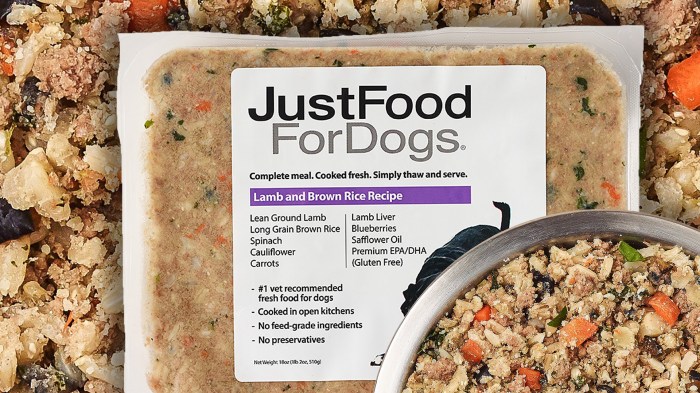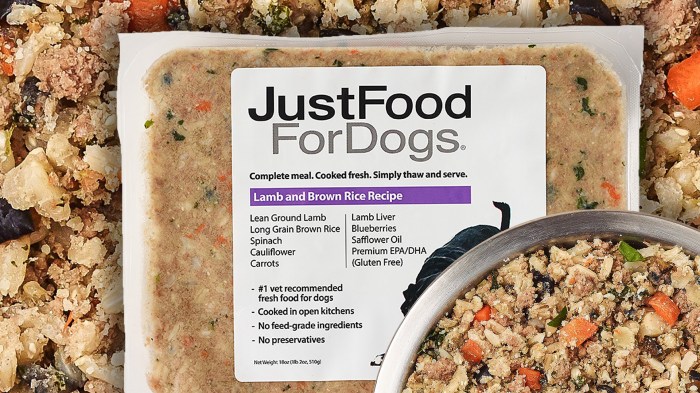Just food for dogs DIY sets the stage for this enthralling narrative, offering readers a glimpse into a story that is rich in detail and brimming with originality from the outset.
The world of dog nutrition is vast and complex, with a plethora of options available for pet owners. From commercial kibble to gourmet meals, there’s a seemingly endless array of choices. But what if you could create a custom diet for your furry friend, tailored to their individual needs and preferences? This guide explores the fascinating realm of DIY dog food, empowering you to craft nutritious and delicious meals for your canine companion.
Understanding Dog Nutrition: Just Food For Dogs Diy

Just like humans, dogs need a balanced diet to thrive. Providing your furry friend with the right nutrients ensures their optimal health, energy levels, and overall well-being. This section will guide you through the essentials of dog nutrition, breaking down the crucial components that contribute to their healthy development.
Essential Nutrients for Dogs
Dogs require a variety of essential nutrients to maintain their health and function. These nutrients can be categorized into macronutrients and micronutrients. Macronutrients provide energy and building blocks for the body, while micronutrients play vital roles in various bodily processes.
Macronutrients
Macronutrients are the primary sources of energy and building blocks for the body. They are essential for growth, development, and maintaining vital functions.
- Protein: Protein is crucial for muscle growth and repair, hormone production, and maintaining a healthy immune system. It is also essential for the development and function of vital organs. Good sources of protein include meat, poultry, fish, eggs, and dairy products.
- Carbohydrates: Carbohydrates provide energy for daily activities, and are particularly important for active dogs. They are also involved in the regulation of blood sugar levels. Complex carbohydrates, found in whole grains and vegetables, are preferred over simple carbohydrates, found in processed foods and sugary treats.
- Fats: Fats are an important source of energy and help with the absorption of certain vitamins. They also play a role in maintaining healthy skin and coat. Choose healthy fats like those found in fish oil, flaxseed oil, and certain nuts and seeds. Avoid excessive amounts of saturated and trans fats, which can be harmful to your dog’s health.
Vitamins and Minerals, Just food for dogs diy
Vitamins and minerals, though needed in smaller amounts, are essential for a wide range of bodily functions. They contribute to everything from bone health and vision to immune system function and energy production.
- Vitamins: Vitamins are organic compounds that the body needs in small amounts. They are essential for various metabolic processes, including growth, development, and immune function.
- Vitamin A: Important for vision, growth, and immune function.
- Vitamin D: Essential for calcium absorption and bone health.
- Vitamin E: Acts as an antioxidant, protecting cells from damage.
- Vitamin K: Essential for blood clotting.
- B Vitamins: A group of vitamins that play important roles in energy production, metabolism, and nerve function.
- Minerals: Minerals are inorganic substances that are essential for various bodily functions.
- Calcium: Crucial for bone and teeth development.
- Phosphorus: Works with calcium for bone health and energy production.
- Magnesium: Important for muscle and nerve function.
- Potassium: Essential for fluid balance and muscle function.
- Sodium: Plays a role in fluid balance and nerve function.
- Iron: Essential for oxygen transport in the blood.
- Zinc: Important for immune function and wound healing.
Daily Nutritional Requirements
The specific nutritional needs of dogs vary based on breed, age, activity level, and health status. Here is a general overview of daily nutritional requirements for different life stages:
| Life Stage | Protein (%) | Fat (%) | Carbohydrates (%) |
|---|---|---|---|
| Puppy (up to 6 months) | 22-30 | 15-20 | 30-40 |
| Adult (1-7 years) | 18-25 | 10-15 | 40-50 |
| Senior (over 7 years) | 15-20 | 8-12 | 45-55 |
Note: These are just general guidelines. Consult with your veterinarian for specific recommendations based on your dog’s individual needs.
By embracing the principles Artikeld in this guide, you can embark on a journey of culinary creativity, ensuring your dog’s well-being while fostering a deeper connection through the act of preparing their meals. Whether you’re a seasoned chef or a novice in the kitchen, the rewards of crafting homemade dog food are plentiful, enriching both your dog’s life and your own.
Making your own dog food can be a rewarding experience, giving you control over the ingredients and ensuring your furry friend gets the best nutrition. If you’re looking for a way to grow fresh, healthy ingredients, you might want to explore the world of hydroponic DIY. This method allows you to cultivate nutrient-rich vegetables right in your home, perfect for supplementing your dog’s homemade meals with a boost of vitamins and minerals.

